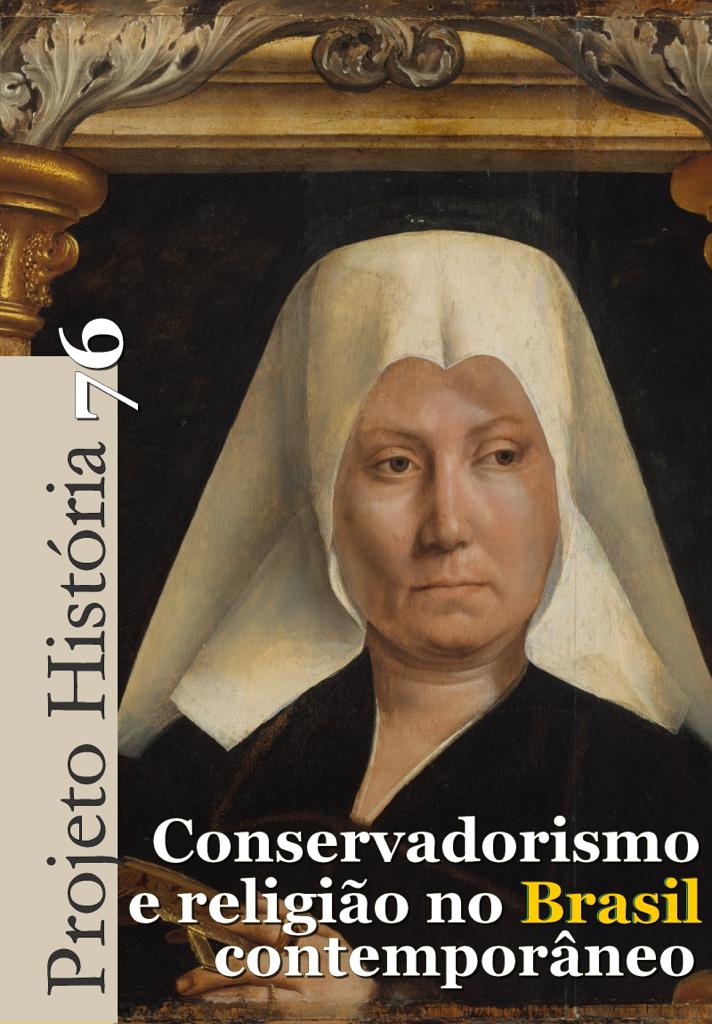Ultramontanism and the catholic reaction to modernity in the 19th century
DOI:
https://doi.org/10.23925/2176-2767.2023v76p226-263Keywords:
Ultramontanism, 19th century, Europe, Catholic ChurchAbstract
The concept of ultramontanism is among those that, not infrequently, cause more complications than help historians of the Catholic Church. This is because it is a complex historical concept, whose word that names it underwent a series of changes in meaning until it came to designate a specific Catholic tendency of the 19th century. In addition to the complexities inherent to the concept itself, ultramontanism is still involved in a series of other concepts, categories or expressions (such as “Catholic reform”, or “Romanization”) which, in the Brazilian case, mischaracterized its original nuances, whether for its sometimes careless use, or for the singularities generated by the various adaptations of ultramontane ideals throughout the non-European Catholic world. Hence, in this paper I initially propose a conceptual approach to the word “ultramontanism” and then analyze the movement in its contrast with other Catholic trends and with the tumultuous historical events of the 19th century. Finally, I propose an analysis of the relationship between ultramontanism and the consolidation of the modern world in nineteenth-century Europe, as well as the way in which, from then on, Catholicism represented an insistent attempt to return to the past in the face of the advance of modernity.
References
ANDERSON, M. Windthorst: a political biography. Oxford: Clarendon Press, 1981.
AUBERT, R. Le pontificat de Pie IX (1846-1878). Paris : Bloud et Gay, 1952. apud: LE GOFF, J. História e Memória. Campinas (SP): Editora da Unicamp, 2013.
BERGER, Peter; LUCKMANN, T. Modernidade, pluralismo e crise de sentidos: a orientação do Homem moderno. 2ª edição. Petrópolis: Vozes, 2005
BLACKBOURN, D. Progress and Piety: Liberalism, Catholicism and the State in Imperial Germany. History Workshop Journal. n. 26, Autumn, 1988.
BLESSING, W. K. Staat und Kirche in der Gesellschaft: Institutionelle Autorität und mentaler Wandel in Bayern während des 19. Jahrhunderts. In: KOCKA, J.; BERDING, H.; WEHLER, H-U. (orgs.). Kritische Studien zur Geschichtswissenschaft. Vol. 51. Göttingen: Vandenhoeck & Ruprecht, 1982.
CLARK, C. The New Catholicism and the European culture wars. In: CLARK, C.; KAISER, Wolfram. (Orgs.). Culture wars: Secular-Catholic Conflict in Nineteenth-Century Europe. Cambridge: Cambridge University Press, 2003.
FALCON, F.; RODRIGUES, C. (Orgs.). A “epoca pombalina” no mundo luso-brasileiro. Rio de Janeiro: FGV: Faperj, 2015.
FRAILE MIGUÉLEZ, M. Jansenismo y regalismo en España: estudio preliminar de Rafael Lazcano. Guadarrama (Madrid): Editorial Agustiniana, 2010.
GIFTSCHÜTZ, F. Leitfaden für die in den k.-k. Erbländen vorgeschriebenen Vorlesung über die Pastoraltheologie. Vienna: Nabu Press, 2011.
GOMES FILHO, R. Kulturkampf: a Igreja Católica e a construção da modernidade e nação alemã no século 19. Curitiba (PR): CRV, 2019.
GOMES FILHO, R.; ARAÚJO, F. M. P. de. Ultramontanism and Catholic Modernism: An Analysis of Political- Ecclesiastic Controversy in Germany of the 19th Century. Global Journal of Human-Social Science: History, Archaeology & Anthropology. Vol. 20, n. 2, 2020.
GREGÓRIO XVI, P. Mirari Vos. 1832. Disponível no sítio eletrônico: Disponível em: https://www.vatican.va/content/gregorius-xvi/it/documents/encyclica-mirari-vos-15-augusti-1832.html. Acesso em: 06/10/2022.
GROETHUSYEN, B. Die Entstehung der bürgerlichen Welt – und Lebensanschaung in Frankreich. Halle: Max Niemeyer, 1927.
GROSS, M. B. The war against Catholicism: liberalism and the anti-catholic imagination in nineteenth-century Germany. Michigan: The University of Michigan Press, 2011.
KOSELLECK, R. Futuro passado: contribuição à semântica dos tempos históricos. Rio de Janeiro: Contraponto, 2012.
LAGRÉE, M. Religião e Tecnologia: a bênção de Prometeu. Bauru (SP): EDUSC, 2012.
LEÃO XIII, P. Immortale Dei: A constituição cristã dos Estados. São Paulo: Paulus, 2005.
MANOEL, I. A. O Pêndulo da História: tempo e eternidade no pensamento católico (1800-1960). Maringá: UEM, 2004.
MARTINS, W. de S. Monarquia portuguesa e política regalista: ordens religiosas no final do setecentos. Almanack, Guarulhos, n. 25, 2020.
MATA, S. da. “Entre Syllabus e Kulturkampf: revisitando o “reformismo” católico na Minas Gerais do Segundo Reinado”. In: CHAVES, C. M.; SILVEIRA, M. A. (Orgs). Território, conflito e identidade. Belo Horizonte: Argvmentvm, 2007.
MELO, A. J. de. Jansenismo no Brasil: traços de uma moral rigorista. Aparecida: Editora Santuário, 2014.
O’MALLEY, J. W. Vatican I: The Council and the Making of the Ultramontane Church. Harvard University Press, 2018.
PIO IX, P. Quanta Cura. 1861. Disponível no sítio eletrônico: https://www.vatican.va/content/pius-ix/it/documents/encyclica-quanta-cura-8-decembris-1864.html. Acesso em 04/10/2022.
PIO IX, P. Qui pluribus: Sobre os erros contemporâneos e o modo de os combater. Petrópolis: Vozes, 1947.
PIO IX, P. Syllabus. MONTFORT Associação Cultural. Sítio Eletrônico: http://www.montfort.org.br/old/index.php?secao=documentos&subsecao=enciclicas&artigo=silabo Acesso: 06/10/2022.
PIO X, P. Carta Encíclica Pascendi Dominici Gregis: Do Sumo Pontífice Pio X aos Patriarcas, Primazes, Arcebispos, Bispos e outros ordinários em paz e comunhão com a Sé Apostólica sobre as doutrinas modernistas. Roma, 8 de setembro de 1907. Disponível em: https://w2.vatican.va/content/pius-x/pt/encyclicals/documents/hf_p-x_enc_19070908_pascendi-dominici-gregis.html. Acesso em: 06/04/2017.
PRINTY, M. Enlightenment and the Creation of German Catholicism. Cambridge University Press, 2009. Kindle edition. 2009, p. 142.
PROST, A. Doze lições sobre a história. 2ª edição. Belo Horizonte: Autêntica, 2012.
RAAB, H. Geschichte des Schlagworts “ultramontan” im 18. Und frühen 19. Jahrhundert. Historisches Jahrbuch, Vol. 81. München; Freiburg: Karl Alber Verlag, 1962.
SANTIROCCHI, Í. D. Uma questão de revisão de conceitos: romanização – ultramontanismo – reforma. Temporalidades: Revista Discente do PPGHIS da UFMG, vol. 2, n. 2, 2010.
SANTOS, C. dos. Jansenismo e antijansenismo nos finais do Antigo Regime. Porto: CITCEM/Edições Afrontamento, 2011.
SOUZA, E. S. Jansénisme et réforme de l' Eglise dans l'Empire portugais (1640 à 1790). Paris: Centre Culturel Calouste Gulbenkian, 2004.
SPERBER, J. Popular Catholicism in Nineteenth-Century Germany. New Jersey: Princeton University Press, 1984.
WEIß, O. Der Ultramontanismus. Grundlagen – Vorgeschichte – Struktur. Zeitschrift für bayerische Landesgeschichte , n. 41, 1978.
WEISS, O. Die Redemptoristen in Bayern: Ein Beitrag zur Geschichte des Ultramontanismus. Sankt Ottilien: EOS-Verlag, 1983.
WITTOLA, M. A. Schreiben eine österreichischen Pfarrers über die Toleranz nach den Grundsätzen der katholischen Kirche. 1781, p. 14. Disponível em: https://www.digitale-sammlungen.de/en/view/bsb10547324?page=18,19
Downloads
Published
How to Cite
Issue
Section
License
Copyright (c) 2023 Projeto História : Revista do Programa de Estudos Pós-Graduados de História

This work is licensed under a Creative Commons Attribution 4.0 International License.

Este obra está licenciado com uma Licença Creative Commons Atribuição 4.0 Internacional.




